November 27, 2025 | 19:32 GMT +7
November 27, 2025 | 19:32 GMT +7
Hotline: 0913.378.918
November 27, 2025 | 19:32 GMT +7
Hotline: 0913.378.918

Researchers connect the eSoil to a low power source for stimulating plant growth.
Hydroponics is the technique of growing plants using a water-based nutrient solution rather than soil. This approach minimizes water consumption appreciably and retains all essential nutrients within the system, a feat unattainable in conventional agricultural practices.
Hydroponics is also used in vertical farming to grow lettuce, herbs, and other vegetables.
This soil, which the researchers named eSoil, conducts electricity and is designed specifically for hydroponic farming. Their experiments found that barley plants grown in this electrically conductive soil grew 50% more in just 15 days when their roots were given an electric boost.
“In this way, we can get seedlings to grow faster with less resources,” said Professor Eleni Starvrinidou, first author of the study and associate professor at Linköping University.
“We don’t yet know how it actually works, which biological mechanisms that are involved. What we have found is that seedlings process nitrogen more effectively, but it’s not clear yet how the electrical stimulation impacts this process,” she added.
The researchers explained that in hydroponics, people often use mineral wool to grow plants, but it's not good for the environment and takes a lot of energy.
Whereas, eSoil is made up of cellulose and a conductive polymer. This mix is not new, but it's the first time it's used for growing plants this way.
Before, researchers used high voltage to help plants grow, but eSoil uses very little energy and is safe. The scientists think this study will lead to more research on hydroponics.
Pointing out that currently, the world is facing a double whammy of a growing population and climate change, Professor Eleni Stavrinidou, leader of the Electronic Plants group, said that “it’s clear that we won’t be able to cover the food demands of the planet with only the already existing agricultural methods.
“But with hydroponics we can grow food also in urban environments in very controlled settings,” she added.
While it may not solve all food problems, it can help in places with little space for farming and tough weather conditions.
The study was published in the PNAS journal.
(IE)

(VAN) A new study reveals how the simultaneous effects of ocean acidification, salinity and loss of oxygen are making the world more fragile.

(VAN) Hopes are growing that the creation of the first 3D turkey gut model could be a turning point in the battle against the virulent blackhead disease.

(VAN) Tyson, America’s biggest meat supplier, plans to shutter one of its largest beef processing plants as the industry continues to struggle with low cattle supplies and political pressure from Washington.

(VAN) New FAO study shows how digital solutions are empowering farmers and fishers to prevent losses and build resilient agrifood systems.

(VAN) Brazil's COP30 presidency pushed through a compromise climate deal on Saturday that would boost finance for poor nations coping with global warming but that omitted any mention of the fossil fuels driving it.

(VAN) Poultry farmers in the UK have been warned that they could face one of the worst winters yet for bird flu.

(VAN) Prices of main-crop paddy have risen sharply, with jasmine rice hitting 16,100 baht per tonne — the highest level in years.